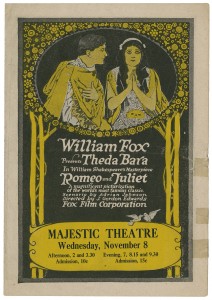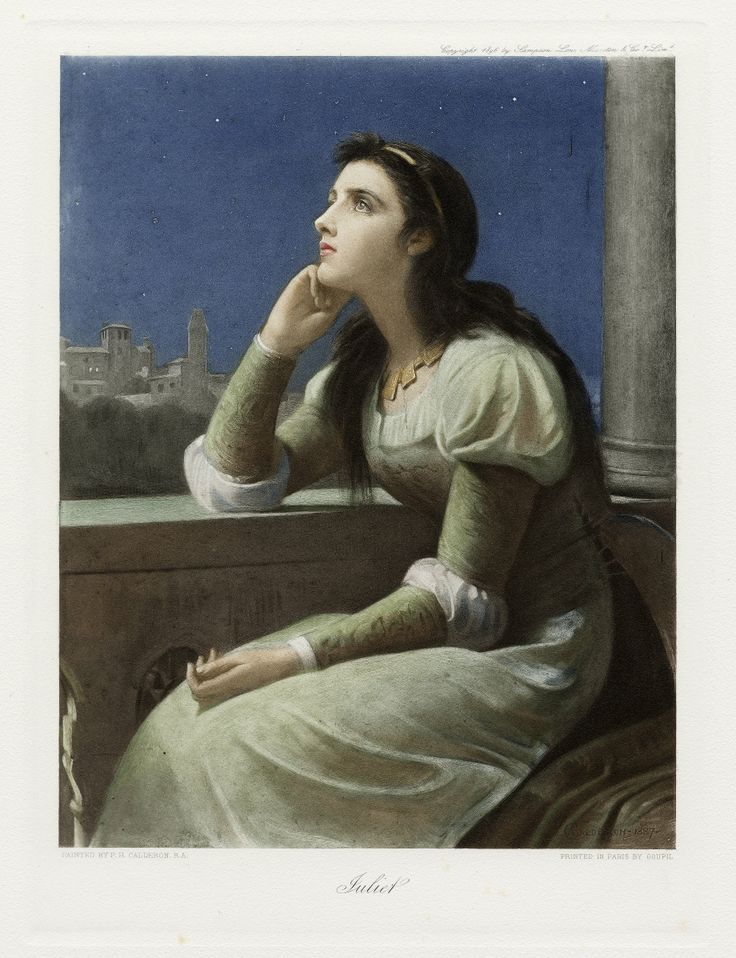
Promotional poster from the 1916 film of “Romeo and Juliet.” Courtesy of the Folger Shakespeare Library.
Poem for the Night
The easy answer is it began with grief,
the sun dumbstruck, the moon full and sulky.
Another answer is it began with the moon,
the way it always appeared weeping,
the way someone wished it into a weapon.
The question had something to do with the lack
of sorrow on the knife’s crescent blade, the lack
of a lullaby to outshout the moon
From outside someone asked, Does it always sob this loudly?
Someone else sang so loudly even the moon had to shout.
Grief, meanwhile, curled into the room’s abandoned mouth.
Silent and sinful as a wolf, it held its tongue.
She wears her beauty
She wears her beauty like a broken wristwatch.
She wears her beauty like a fragile, foreign thing.
She wears her beauty like skin that won’t wash clean.
She wears her beauty like plexiglass.
Every once in a while she forgets her beauty in the car, windows closed tight.
Just last Tuesday, she ransomed her beauty with her last remaining ____________.
She nags her beauty: stand up straighter, don’t cry with your mouth full.
She wears her beauty like a sharp stick in the eye.
She wears her beauty like a biohazard.
She wears her beauty like swear words in several languages.
She wears her beauty all out of proportion.
Her beauty craves coconut, pawpaw, sulfur.
Her beauty adheres to clean, slick surfaces.
Her beauty’s a hand-me-down, mother to daughter, moan by moan.
Her beauty is mealy-mouthed, often off point.
She wears her beauty like the hit parade.
She takes her beauty to Sunday brunch. Sometimes they play gin rummy.
Her beauty is not seaworthy, not a harbinger.
Her beauty is not bulletproof nor free of animal products.
The rumors aren’t true: she dirty danced her beauty only once.
Even if she could eat her beauty like caviar, like bread . . .
Even if her beauty hadn’t cracked her back into a question mark . . .
Even if her beauty didn’t rain for 40 days and 40 nights . . .
She wears her beauty like a ghostwritten memoir.
She wears her beauty like flight.
She wears her beauty like the last surviving member of the band.
Her
I bloom like grief on the roses of your cheeks.
What now my love? How long this lasts is a symptom
not of luck or even love but the long leak of loneliness.
Faith is not thicker than grief. Grief is not polite.
What now my love? How long this lasts is a symptom—
are you more hero or villain? Do I want to be rescued?
Faith is not thicker than grief, grief is not polite,
I am the sum of too many broken pieces.
Are you more hero or villain? Do I need to be rescued?
You are the answer to prayers I’d forgotten I asked.
I am the sum of too many broken pieces;
You are one answer but I’m allergic to glue.
You are the answer to prayers I’d forgotten I’d asked—
I want to sunset in you. My flesh willing, my spirit afraid.
You are my remedy but I’m allergic to glue.
I have mislaid the heart that can be loved.
I want to sunset in you, my spirit willing, my flesh afraid
not of luck or even love but the long leak of loneliness.
Have I lost the heart that can be loved?
I bloom like grief on the roses of your cheeks.
Him
A found poem: Interview with Michael Fassbender and Steve McQueen, Los Angeles Times, November 2011
So, you’re in this prison on moral grounds?
Shall I show you something that’s really
going to make you laugh? We are prisoners
of a coming-of-age situation: bodies
deadpan, naked except for hunger.
Hero or monster, you must understand
hunger is a notorious maze, my heart just another
prize-winning protest-of-one.
Is your silence how it feels just before
tender violence breaks out?
Her
A found poem: Interview with Michael Fassbender, British GQ, February 2012
In an unremarkable bar you conjure
an indecent proposal: Give in.
You take off your charm, eyes backlit
with a kind of handsome sadness.
Byron gone off-duty,
you chameleon bashed-up, vulnerable.
How many times can a girl fast-talk
herself out of hunger?
I want to take off my locks in the center of the maelstrom.
I want to acquiesce, accept your gun-metal desire.
I want things to get very haywire very quickly.
I want to erupt.
“She wears her beauty” reprinted from Voice Lessons, Plan B Press, 2011, by permission of the author.
Paulette Beete's poems, fiction, and nonfiction have appeared in journals including Rhino, Crab Orchard Review, Escape into Life, and Provincetown Arts. Beete has published two chapbook collections: Voice Lessons (Plan B Press, 2011), and Blues for a Pretty Girl (Finishing Line Press, 2005). She lives in Silver Spring, MD and blogs at The Home Beete. She also watches a lot of British cop shows. Read more by this author: Paulette Beete: Fall 2011
